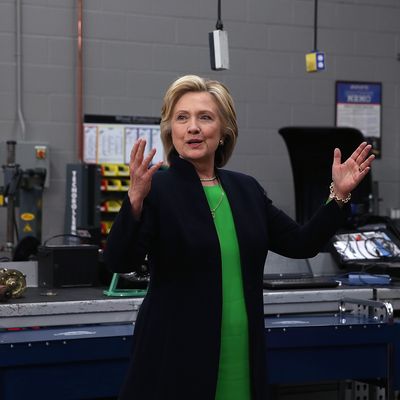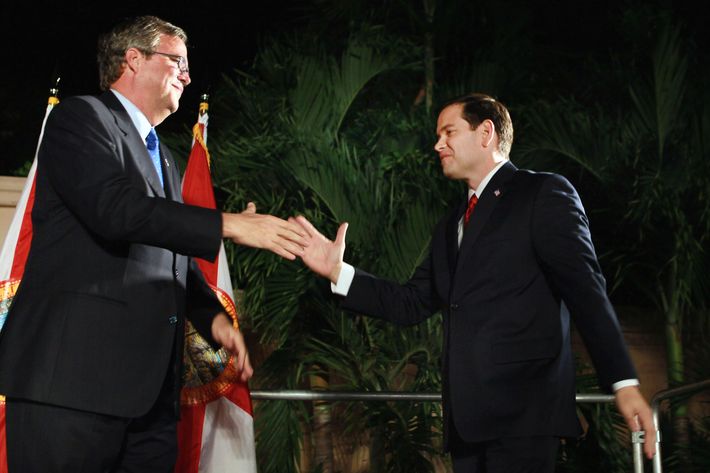
Most weeks, New York Magazine writer-at-large Frank Rich speaks with contributor Alex Carp about the biggest stories in politics and culture. This week, the magazine asked him about various presidential announcements and whether Scientology will lose its tax-exempt status.
With Sunday’s announcement video and her Iowa campaign tour, Hillary Clinton is officially in it to win it again. She faces no Democratic challengers who might pose a serious threat to her securing her party’s nomination. It’s 9 months until anyone votes in Iowa or New Hampshire, 15 months until the Democratic convention. What will or can she accomplish?
On the basis of what little we’ve seen thus far, Hillary Clinton’s opening gambit is to persuade voters that a candidate of wealth and privilege, who has received fat checks for speaking to Goldman Sachs and will have a projected $2.5 billion campaign war chest, is as simple and down-home and as jus’ folks as the Iowa farmers in Grant Wood’s American Gothic. It is truly delicious to watch. There’s a kind of Thelma and Louise vibe to the stills from the security video showing Clinton and Huma Abedin in shades placing their order incognito at a Chipotle. The shots of Clinton holding court around a table with a few “everyday Americans” — as she has decided to call them — while dozens of reporters eavesdrop on the periphery are worthy of a Christopher Guest parody.
Already she has taken flak for her announcement video, with its oh-so-carefully focus-grouped demographic of American faces and its content-free declaration by the candidate herself. Jon Stewart, for one, likened it to a State Farm commercial. No one will remember or care weeks from now, if they do even now. The point of it, and of the political theater Clinton is enacting in Iowa, does not seem intended to reach actual voters, but the political press (and perhaps those who write the cold open at Saturday Night Live). All of it says: “I am not going to make the same disastrous mistakes I made in 2008,” when her announcement video was chilly and pompous and her campaign events were big, corporate-style displays of Establishment political might designed to trumpet her candidacy’s (ill-fated) “inevitability.” Message received! We see that her new campaign events are bite-size and that she is really listening to the Everydays rather than delivering pronouncements to them from on high. That said, what’s most concerning about her opening video is not its soupiness but its manufactured-by-committee tone. It’s all too clear she’s acting at being down-to-earth rather than truly inhabiting her chosen role. Unscripted Hillary still feels scripted.

Meanwhile, we risk overdosing on the minutiae of her journey. Do we really need a CNN graphic depicting her van, Scooby, as it moves across an Iowa map? Do we really care that she ordered a chicken burrito bowl at Chipotle, or a masala chai tea at a later stop? My favorite bit of commentary thus far comes from Mark Halperin of Bloomberg News, who could be found on television observing that “we’ve never seen her get a burrito before.” History in the making, I guess. But she’s running for president of the United States, not Yelp.
On the other hand, we’re now seeing an accelerating flurry of announcements by the large field of Republican contenders. Each is dissected for its effectiveness. Does it really matter what a candidate does to declare his candidacy?
The main goal is to do no harm. Sometimes you can. John Kerry did not help his cause when he tried to counter George W. Bush’s “Mission Accomplished” military image by traveling to South Carolina to officially declare his 2004 candidacy in front of a docked aircraft carrier while a band played “Anchors Aweigh.” So far, none of the GOP candidates have made such a gaffe, and their staged events are blurring into one another fast. So are the empty campaign claims. Marco Rubio’s efforts to tap into Americans’ growing concern about income inequality don’t sound much different from Clinton’s despite the fact that his own tax schemes are as tilted toward the wealthy as Mitt Romney’s. What I enjoy about Rubio, in a spectator sport sort of way, is his constant emphasis on his own youth (he’s 43) and his age-baiting of both Clinton and his onetime mentor and fellow Floridian, Jeb Bush. This may backfire when voters figure out that his contempt for his elders might be turned into policy when he proposes monkeying around with Medicare. But mainly it’s going to be fun to watch him and his former bro Bush try to claw each other’s eyes out in the months to come.

One striking feature of the GOP announcements so far is the absence of the social issues the Republican right has held dear. The presidential contenders don’t seem to want to talk much about abortion after their party’s recent near-death experiences with “legitimate rape” talk, and with a female opponent on the horizon. And they are trying to keep mum about gay marriage. Not for nothing did the Clinton campaign bait them by including an engaged gay couple in her announcement video, as well as what seemed to be a shot of a lesbian couple. The GOP opposition to marriage equality is a tremendous obstacle to a party that wants to reach young voters in 2016, and much as it tries to downplay that antipathy it will not be able to. As the Washington Post reported this week, the conservative base is mobilizing to stage emotional protests and step up punitive local anti-gay-rights legislation once the Supreme Court holds its hearing on same-sex marriage later this month. The Republican presidential candidates will not be able to go hide in a closet.
Alex Gibney recently wrote an op-ed in the Los Angeles Times detailing the campaign from the Church of Scientology against people who participated in his documentary Going Clear: Scientology and the Prison of Belief and listing reasons why the church’s tax-exempt status should be revoked. Do you think there’s a chance that could happen?
Gibney’s film, like its source, Lawrence Wright’s book, is a huge breakthrough. As any journalist who has had dealings with Scientology knows — and I have had a couple of brief skirmishes myself — this “church” uses its huge financial clout to stalk, thwart, and intimidate anyone who challenges it, whether former converts or journalists or authorities. In this regard, one of Scientology’s most extraordinary achievements was its successful campaign to be declared a nonprofit religion and given tax-exempt status — a prize negotiated with George H. W. Bush’s IRS commissioner, Fred Goldberg Jr., in early 1990s. It was an abruptly revealed behind-closed-doors decision that overturned a quarter century of previous IRS rulings. Going Clear, in the interest of narrative economy, only deals with this incredible bit of tax history briefly. It’s past time for the whole story to be unearthed, and for this huge federal gift to Scientology to be stopped. Why in heaven’s name should the rest of America’s taxpayers be subsidizing David Miscavige and the empire so graphically laid bare at long last in Going Clear?






























